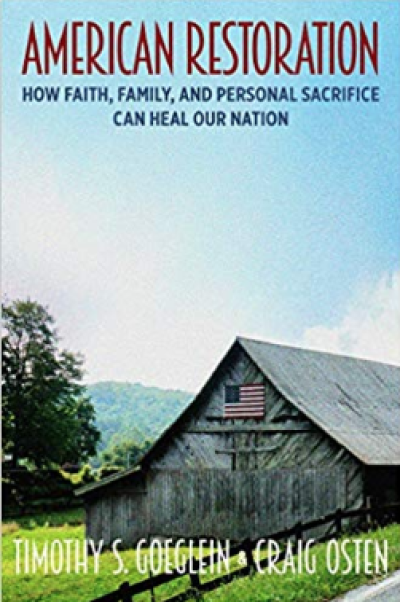American Restoration: How faith, family, and personal sacrifice can heal our nation

“A new national counterculture.” That’s what Tim Goeglein and Craig Osten call for in their new and bracing book, American Restoration: How Faith, Family, and Personal Sacrifice Can Heal Our Nation.
They are right. Christianity is, by definition, always countercultural. But in this needed and gracefully written book, Goeglein and Osten are calling for the renewal of our culture itself, for a sweeping change in the unspoken assumptions about good and evil, family and the arts, and all the other facets of morality and social life. As opposed to Rod Dreher’s Benedict Option, the authors argue that “this is not a time for good people of faith to withdraw completely from society.”
To this end, they call for “various specific acts of renewal that all of us can participate in to make this national restoration possible” through acting as Edmund Burke’s “little platoons” who implement practical solutions to national problems.
The book is divided into 15 chapters, each of which begins with the word “restoring:” restoring America’s founding principles, religious liberty, a culture of life, and so forth. Goeglein and Osten pinpoint many of the things composing the foundation of American public and private life and whose steady erosion has led to what the late Democratic Senator Daniel Patrick Moynihan termed the “dumbing-down of deviancy.” Put another way, the gradual acceptance of casual immorality, the debasement of human dignity, statism as an alternative to Judeo-Christian faith, and broad incivility in the media, politics, the arts, and social relations.
A highlight of the book is its chapter on virtue. Its discussion is informed by a clear and compelling presentation of the classical virtues and their confluence with the Judeo-Christian “view of holiness and the human person.”
This is key. As the Founders argued extensively (something else the authors note), unless we wisely govern ourselves, our inner lives and our external behaviors, we will be unable to sustain political self-government corporately. While only Christ can empower fundamental personal transformation, the conformity of one’s mind and conduct to the essentials of honor and dignity are required in any society that hopes to long endure with any semblance of liberty and justice for all.
Goeglein and Osten make clear that such virtue is crafted best in the family and the family’s church. In this, their argument is not unique. It is just imperative and, therefore, bears the fine exposition the authors give it.
Appealingly, the book includes a chapter on “restoring the concept of the gentleman.” This is a welcome contribution, in that the very concept of gender is being relentlessly challenged by popular culture and the condescending elites in the academy. Goeglein and Osten encourage Christians to behave with courtesy and kindness to women not because the latter are too delicate to face life on their own but because their very femininity warrants respect and consideration.
Having worked closely with Tim Goeglein in the office of then-Senator Dan Coats for more than three years in the early 1990s and been good friends over the ensuing two decades, I can speak to Tim’s respect for women, his general courtesy and unselfconscious good manners. I recall when he escorted an elderly former teacher around the Capitol, honoring her with genuine warmth and appreciation. After she and I met and chatted for a few moments, she smiled at me and said, “Tim is quite a guy.” These many years later, I still agree.
Goeglein and Osten demonstrate a good bit of careful thinking and intellectual digging. They employ classical texts, political philosophers, contemporary newspapers, and more. They also include stories of people who have lived-out the principles they articulate, which lend both weight to the authors’ arguments and show that these same principles can be experienced in practice.
The book only tangentially addresses the potent issues of race or technology, whose omission is disappointing. It can be hoped that in future editions, the authors will address these themes with the same care as they have so many others.
Goeglein and Osten conclude, “Christ’s kingdom is not of this world, but we are also called to be salt and light to the world and to go into it to proclaim the Gospel. We must continue to engage with the world while not being conformed to it.” Thinking Christians should agree.
This wise, winsome, and thorough work should be read by everyone concerned with rebuilding an America in which all people, Christian and non-, can live and thrive. Goeglein and Osten share both a great burden and a great vision. Followers of Jesus would do well to consider both.




























